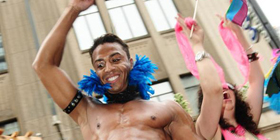Queer leaders have been distancing themselves from Pride Toronto since it announced it would ban the term “Israeli Apartheid” from this year’s parade. But the latest latest blow to Pride Toronto appears to be of a different scale: 18 former grand marshals, honored dykes and awards recipients will renounce their honors and give back their awards to Pride Toronto, according to a press release from Queers Against Israeli Apartheid (QuAIA.)
In what could be the second ugly scene on the lawn of Pride Toronto’s offices in as many weeks, QuAIA invited photographers and the media to the Jun 7 event.

Elle Flanders, a former Pride Toronto board member and spokesperson for QuAIA, says they’re staying mum about who exactly will be on hand.
“It’s people who have been involved, with a long history of Pride,” she says. “What we’re showing is that Pride is not a corporate entity. It’s the people who make it up.”
From the release:
Pride Toronto’s first choices for Grand Marshal and Honoured Dyke of the 2010 Pride Parade will join 18 former Pride grand marshals, honoured dykes, and award recipients — including prominent philanthropist, past Grand Marshal, and Pride Awards founder Salah Bachir — in returning their accolades to the organization on Monday, June 7.
WHAT: Press conference and return of awards with photo opportunity
WHEN: Monday, June 7 at 10:00 a.m.
WHERE: 519 Church Street Community Centre Auditorium

 Why you can trust Xtra
Why you can trust Xtra


